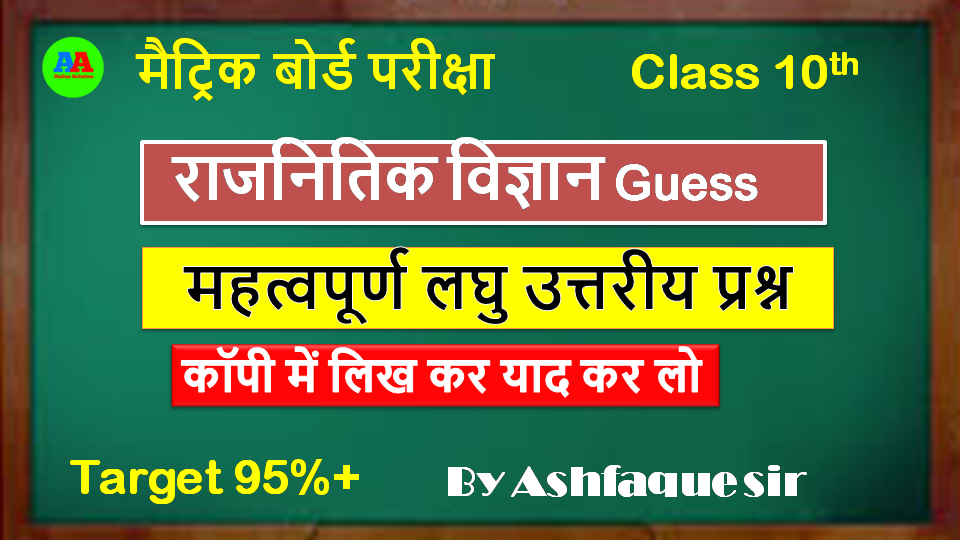Class 10th social science subjective question, class 10th political science vvi subjective question, 10th sst rajnitik wigyan subjective question, 10th social subjective question guess, 10th social subjective question, bihar board social science question, 10th social science guess question, rajnitik wigyaan question,
Q.1. रंगभेद क्या है?
Ans – रंग-भेद का तात्पर्य चमड़ी (Skin) के रंग के आधार पर लोगों में भेदभाव करना है। दक्षिण अफ्रीका में गौरव लोगों की सरकार ने बहुसंख्यक वाले लोगों के प्रति विभिन्न प्रकार के भेदभाव की नीति अपनाई थी। इसे रंगभेद नीति के नाम से जानते हैं
Q. What is apartheid?
Ans – The meaning of color discrimination is to discriminate between people on the basis of the color of the skin. The Pride people’s government in South Africa adopted a policy of discrimination of various kinds against the majority. This is known as apartheid policy.
2. समवर्ती सूची क्या है ?
उत्तर :- केन्द्र और राज्यों के बीच शक्ति के बँटवारे के लिए निर्मित तीन सूचियों में एक ऐसी सूची है जिसके विषयों पर केन्द्र और राज्य दोनों कानून बना सकते हैं । परन्तु विरोध की स्थिति में केन्द्रीय कानून ही प्रभावी होता है । समवर्ती सूची में 52 विषय आते हैं । जैसे -आपराधिक कानून प्रक्रिया, सिविल प्रक्रिया, शिक्षा, विवाह एवं तलाक, श्रम कल्याण, बिजली आदि।
What is Concurrent List?
Answer: – Among the three lists prepared for the distribution of power between the center and the states, there is such a list on whose subjects both the center and the states can make laws. But in case of opposition, only the central law prevails. There are 52 subjects in the Concurrent List. Such as – criminal law process, civil procedure, education, marriage and divorce, labor welfare, electricity etc.
3. दल – बदल कानून क्या है ?
उत्तर :- जब कोई प्रतिनिधि किसी दल विशेष के चुनाव चिह्न पर चुनाव लड़ते हैं और चुनाव जीतने के बाद उस दल को त्याग कर किसी दूसरे दल की सदस्यता ग्रहण कर ले तो इसे दल – बदल कहा जाता है । दलबदल की बढ़ती प्रवृत्ति को रोकने के लिए 1985 एवं 2003 में संविधान में संशोधन कर दलबदल कानून बनाया गया । इस कानून के द्वारा यह व्यवस्था की गई है कि यदि कोई सांसद या विधायक दलबदल करता है तो वह सदन का सदस्य होने के आयोग्य करार दिया जाता है ।
What is defection law?
Answer: – When a representative contests election on the election symbol of a particular party and after winning the election, leaving that party and joining another party, then it is called defection. In order to stop the growing trend of defection, the anti-defection law was enacted by amending the constitution in 1985 and 2003. It has been provided by this law that if any MP or MLA defectes, then he is disqualified to be a member of the House.
4. राजनीतिक दल को ‘ लोकतंत्र का प्राण ‘ क्यों कहा जाता है ?
उत्तर :- राजनीतिक दल के बिना हम लोकतंत्र की कल्पना कर ही नहीं सकते । राजनीतिक दल चुनाव में भाग लेते हैं , उम्मीदवार खड़े करते हैं तथा चुनाव में जीत हासिल करने पर सरकार का निर्माण करते हैं । ये जनता को राजनीतिक प्रशिक्षण देते हैं । साथ ही , सत्ताधारी दल के विपक्ष रहने वाली पार्टियों सरकार की गलत नीतियों की आलोचना करके उचित मार्ग दर्शन प्रदान करती है । यही कारण है कि राजनीतिक दलों को लोकतंत्र का प्राण कहा जाता है ।
Why is a political party called the ‘life of democracy’?
Answer: We cannot imagine democracy without a political party. Political parties participate in elections, field candidates and form the government if they win the election. They give political training to the people. At the same time, the parties that are in opposition to the ruling party provide proper guidance by criticizing the wrong policies of the government. This is the reason why political parties are called the lifeblood of democracy.
5. लोकतंत्र से आप क्या समझते हैं ?
उत्तर :- लोकतंत्र का अर्थ है ‘ जनता का शासन ‘ । लोकतंत्र में जनता स्वयं शासन कार्य में भाग लेती है । वह अपने प्रतिनिधियों को चुनती है । सरकार जनता की प्रतिनिधि सभा के प्रति उत्तरदायी होती है । इस प्रकार लोकतंत्र की सबसे अच्छी परिभाषा अब्राहम लिंकन की मानी जाती है । उनके अनुसार , ” लोकतंत्र जनता की, जनता द्वारा और जनता के लिए सरकार है ।
What do you understand by democracy?
Answer:- Democracy means ‘government of the people’. In a democracy, the people themselves participate in the work of governance. She chooses her representatives. The government is accountable to the representative assembly of the people. Thus the best definition of democracy is considered to be that of Abraham Lincoln. According to him, “Democracy is government by the people and for the people.
6. सूचना का अधिकार कानून लोकतंत्र का रखवाला है । कैसे ?
उत्तर :- सूचना का अधिकार अधिनियम , 2005 लोकतंत्र का रखवाला बन चुका है । इससे प्रत्येक नागरिक को यह अधिकार मिल गया है कि वह विभिन्न समस्याओं के समाधान की दिशा में सरकार के द्वारा किए गए कार्यों को जानकारी प्राप्त करें । उससे सम्बन्धित किसी भी अभिलेख की माँग करे । सरकारी अधिकारी के लिए माँगी गई सूचना उपलब्ध कराना उसका कानूनन उत्तरदायित्व बन गया है । इससे गोपनीयता की जगह प्रशासन में पारदर्शिता आई है । पदाधिकारी सतर्क , पारदर्शी और निष्पक्ष रहने के लिए बाध्य हो गए हैं|
Right to Information Act is the keeper of democracy. How ?
Answer: – The Right to Information Act, 2005 has become the keeper of democracy. With this, every citizen has got the right to get information about the work done by the government towards the solution of various problems. Ask for any records related to it. It has become a legal responsibility for a government official to provide the information sought. This has brought transparency in administration instead of secrecy. The office bearers have become obliged to be vigilant, transparent and impartial.

